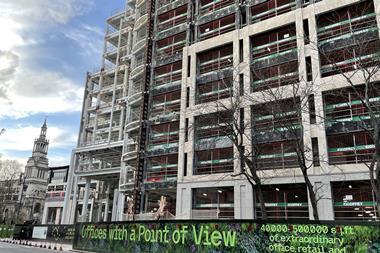Let’s be honest. The property industry has a pretty poor reputation.

When I was doing research for my first interview for a reporting role at Property Week back in April 2018, the impression I got of the sector was not great. In story after story, I read about housebuilders charging leaseholders astronomical ground rents, developers converting 1960s office blocks into low-quality housing and agents willing to turn a blind eye to illicit Russian wealth.
I have since come to realise that stories like these are – thankfully – only a small part of the picture. This industry does a lot of necessary and important work on behalf of both the economy and the country as a whole. We need more housing stock if we’re going to solve the housing crisis. We need high-quality office buildings fit for the future of work. And we need warehouses to continue to form the backbone of the online shopping infrastructure that we have become so used to and have depended on during the pandemic.
None of that exists without a commercial property industry. None of that exists without developers, investors and agents of all stripes doing work that is worthy of praise.
Yet, the negative reputation persists, partly because the bad press it attracts can sometimes be very bad indeed. In this week’s issue, we report on a property developer that has come under fire after evicting a local church and the ethnicity pay gap figures for the top 10 commercial property agencies. Neither story paints the industry in the best light.
How can the industry improve its reputation? It could start by paying women and those from ethnic minorities more. That means promoting them to senior positions. Earlier this year, JLL and Taylor Wimpey both chose women as their chief executives. It’s a great start, so let’s hope we see more of it. Unfortunately, while it is fantastic to have people like Soumen Das as chief financial officer of SEGRO and Geeta Nanda as chief executive of Metropolitan Thames Valley Housing, the dearth of people from ethnic minorities in senior roles is even more acute than the dearth of women.
The industry also needs to do a better job of engaging with local communities, with the situation between Fruition Properties and Pentecostal Mission Church illustrating what happens when communication breaks down. Some companies are great at this, of course. Developers like Edge, Moda and Prologis have all carved out deserved reputations for high-quality buildings in offices, residential and industrial respectively. They do this by approaching stakeholders in the local area, but also by approaching bodies such as BREEAM and Climate Crisis Challenge collaborating partner UKGBC to ensure they are following best practice.
None of this is rocket science. And I’m confident that in another four years’ time, I will be able to open up the pages of Property Week and read countless stories about the immense progress the industry has made.
But I won’t be reading them as news editor of Property Week. Sadly, this will be my final issue for the title that has taught me this industry is so much more than it initially appears. I’m headed over to Investors Chronicle to be its property reporter, where I will continue to keep tabs on this fascinating and evolving industry. So thank you for reading my articles over the years, and as the author John Green says: “Don’t forget to be awesome.”






























No comments yet